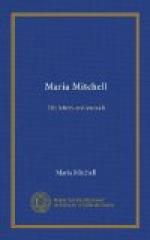“Having been nearly a year in Europe, I had not kept up my reading of American newspapers, but Humboldt could tell me the latest news, scientifically and politically. To my ludicrous mortification, he told me of the change of position of some scientific professor in New York State, and when I showed that I didn’t know the location of the town, which was Clinton, he told me if I would look at the map, which lay upon the table, I should find the town somewhere between Albany and Buffalo.
“Humboldt was always considered a good-tempered, kindly-natured man, but his talk was a little fault-finding.
“He said: ’Lieutenant Maury has been useful, but for the director of an observatory he has put forth some strange statements in the ’Geography of the Sea.’
“He asked me if Mrs. Somerville was now occupied with pure mathematics. He said: ’There she is strong. I never saw her but once. She must be over sixty years old.’ In reality she was seventy-seven. He spoke with admiration of Mrs. Somerville’s ’Physical Geography,’—said it was excellent because so concise. ’A German woman would have used more words.’
“Humboldt asked me if they could apply photography to the small stars—to the eighth or ninth magnitude. I had asked the same question of Professor Bond, of Cambridge, and he had replied, ’Give me $500,000, and we can do it; but it is very expensive.’
“Humboldt spoke of the fifty-three small planets, and gave his opinion that they could not be grouped together; that there was no apparent connection.
“Having lost all his teeth, Humboldt’s articulation was indistinct—he talked very rapidly. His hair was thin and very white, his eyes very blue, his nose too broad and too flat; yet he was a handsome man. He wore a white necktie, a black dress-coat, buttoned up, but not so much so that it hid a figured dark-blue and white waistcoat. He was a little deaf. He told me that he was eighty-nine years old, and that he and Bonpland, alone, were living of those who in early life were on expeditions together; that Bonpland was eighty-five, and much the more vigorous of the two.
“He said that we had gone backwards, morally, in America since he was there,—that then there were strong men there: Jefferson, and Hamilton, and Madison; that the three months he spent in America were spent almost wholly with Jefferson.
“In the course of conversation he told me that the fifth volume of ‘Cosmos’ was in preparation. He urged me to go to see Argelander on my way to London; he followed me out, still urging me to do this, and at the same time assured me that Kansas would go all right.
“It was singular that Humboldt should advise me to use the sextant; it was the first instrument that I ever used, and it is a very difficult one. No young aspirant in science ever left Humboldt’s presence uncheered, and no petty animosities come out in his record. You never heard of Humboldt’s complaining that any one had stolen his thunder,—he knew that no one could lift his bolts.




